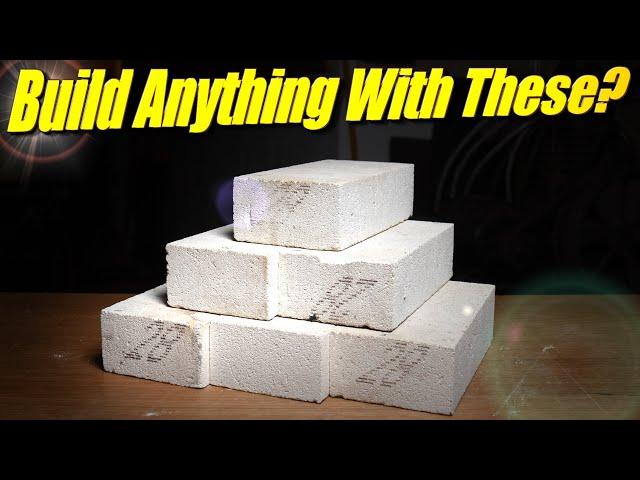
There's a Problem With Fire Bricks
Комментарии:

Maybe cut the bricks in an angle.
If they shrink, they still overlap/seal.
Kinda like Railway track gets joined to deal with the huge contraction and expansion difference between summer and winter.

A Catenary curve is the mathematical name for the curved archway. Your videos are always interesting and a good learning experienece.
Ответить
did you ever get the numb 6 to fire correctly?
Ответить
Great Video! Can you recommend a source for BNZ bricks that has been good?
Ответить
Ifbs expand when heated though… are you sure they didnt shrink on the cool down. They have a plc (permanent linear change) lesser than the original unfired size.
Ответить
Why not tongue and groove the bricks?
Ответить
Hi Paul , I see this video is a year old. Hows your lid holding up now? I have worked in refractory masonry my whole life and I know of a thing or two that could help.
Ответить
There's a Problem With Fire Bricks
Ответить
When heated they expand. Is your metal band not letting them expand freely and causing them to fail? Like a buck stay on a brick kiln. You have to loosen when hot and tighten if you cool them off or you could have crown problems.
Ответить
One could mill some minor tongues & grooves into the mating edges of these bricks so they lock together, OR mill some shallow grooves to accept some small diameter ceramic rope gasket material to seal the gaps. Or, like you said, get a larger piece for the lid-door.
Ответить
Hey Paul. What says you for DIY fire bricks? And one could wonder, " What recipe Paul would use for his DIY firebricks if and when Paul decide to make his own fire bricks ? "
Ответить
You need a dome design to prevent falling from the center of the lid
Ответить
When you're building either the floor or the lid to a homemade kiln or any kiln if you're repairing a store bought 1 even you put a thin smear of refractory clay to fuse it together it will never fall in after you do that
Ответить
The problem is that fire brick is not for what you do. That brick is designed for use in a Steel making Blast Furnace. That brick will withstand 3,000 degrees. But if you shut it down and restart it you will crack the brick. I know that because I worked for North American Refractories Co.
Ответить
Jewelers !
Ответить
"Firing chamber" is the right term.
Ответить
the aliens built the pyramids
Ответить
I sold refractories for 14 years, so I know something about it. Insulating Firebrick is sold based on temperature rating. But you normally want to use a brick rated about 300 degrees higher than your furnace temp. If the brick are run at their rated temperature, you most certainly will get shrinkage. The alternative solution could be to build the brick in the shape of an arch. Then it will not fall in as easily. The other solution would be to use ceramic fiber. But you have to be cautious with ceramic fiber also. You should definitely not exceed the temp ration if the fiber, and ideally the max furnace temp should be a few hundred degrees the temperature rating of the fiber.
Ответить
a way to fix the shrinkage issue on the lid would probably just have one large solid lid rather than have it made up of multiple bricks (but then the cost goes up dramatically) side side note if you go this route just make all the sides solid, expensive but idiot proof)
Ответить
You think is better no use fire bricks?
Ответить
I built a forge out of a new paint can with a lid, a large soup can, and a small fan. Well that and I made a perlite and homemade water glass mixture for the refractory. Some low temp ramp up temps, then worked the temp up to cure the refractory. The whole thing it runs on for testing is sticks and twigs. The whole thing gasifies and creates biochar. I need to add transducers to turn the excess heat into electricity
Ответить
Something tells me the "problem" isn't with the bricks...
Ответить
You might make a tongue and groove type edge to keep your bricks tight with your clamp...
Ответить
Are thes the best thing to build a fireproox storage box from?
Ответить
cut to the chase
Ответить
Hey man! Your electric oven build was so inspiring i'm trying to build my own for ceramics!
I need some help calculating the size and how many coils i'll need.
I got a 50l barrel and insulated it with firebrick and ceramic wool leaving me with a inner chamber like a cyllinder of 22cm diameter and 24cm deep.
What size wire and how much would i need to get to 1200c with that inner chamber size? Any help would be awesome thanks!
Love from Brasil !!

Sorry if you already said it but why not make a solid lid?
Ответить
I am casting my own bricks and molding a 1piece rocket stove using chicken wire for rebar. Recipe includes refractory cement, sand and mostly vermiculite and perlite.
Ответить
Ok ok iloveyou chình chịt kkk😂😂😂
Ответить
I heard someone is having a hot box, man.. can I get in on that bro? 💨🌮💨
Ответить
The force or whatever
Lol

I can geek out on refractory block 😂
Ответить
Why not for your top you could also use duraboard you can get it in 1in 1.5in and so on think they go up to 3in but it has the same heat rating as your brick and can be easily cut to size
Ответить
They dont shrink per say kinda but more important is they expand when heated andcontract when cooling so if you make an adjustable clamp for your furnace you can tighten when you cool and loosen when you fire have to look at the specs on expansion rates for the brick you chose if your using an exposed flame you want the brick to be a hard brick or a superduty
Ответить
Interesting, useful, and entertaining. Humans, not aliens, built things that lasted? Give me a moment to process this counterintuitive, but proud moment.😊
Ответить
Bud!!!!!... that was SOOOOO interesting!!... never cast a bloody thing in my life.. with heat i mean.. but your presentation was so good.. i stayed and watched it all. Good job on the presentation.. and very good skills there man!! Liked it a lot!
Ответить
yeh why dont i just do that LOL
Ответить
ok so tungsten rods can work as re-bar for your lid, it might be more effective to simply put the lid you have on the kiln then line the outside edge of the lid on top with more bricks to counterbalance the lid bricks like a lever, you are right that any artisan that uses high temperature equipment can & should compare notes, with that may I suggest that you try heating an iron object to a red hot state then dusting with powdered glass.
Ответить
Most things expand in heat and shrink when cooling. What I believe is happening is akin to a wooden axe handle shrinking from getting wet. (But wood swells when wet right?) The swelling wet wood is crushed against the axe head. So when it dries out it is smaller. Stick the axe in a bucket of water, it tightens up, when it dries out again, voila! It is even smaller / looser.
So what I believe, you have happening is the cool outer edges of the brick stay dimensionally stable, while the inner brick expands and crushes against the other bricks making fine dust when cooled down it looks like it shrank. You also get some levels of erosion.

I build furnaces up to 3000C and higher. stick with natural elements is my recommendation. I make everything directly from nature
Ответить
Why the hell would you drill all the way through? You only needed to drill an inch or two into each side of the internal faces.... Hell, if you wanted to be extra paranoid for future proofing swapping them around... you could drill a 1.5" depth in the dead center of each brick face, slightly larger so the bricks don't shrink around the expanding metal and break from the forces applied, and then cut 2.5" lengths of your rod... and just slide them into any face that presses against another brick... That should be more than enough to prevent the bricks from falling in and support them when lifting, without compromising the structural integrity of the whole damned brick with a hole that spans the literal length of an entire axis and adds a fracture line that guarantees the brick to be useless if it ever breaks along that line....
Ответить
Consider longer threaded rods and tighten onto springs at one or both ends of each so the tension remains more or less constant with expansion and contraction. My 2c.
Ответить
The shrinking process you are mentioning is so interesting, and something I have never even considered before, in spite of it's simplicity! As an aspiring metallurgist having known about powder metallurgy and sintering, I am wondering if the shrinkage problem might be liked to sintering of the alumina particles. Even though the firing temperatures of the oven are largely underneath what it takes to properly sinterin the industry, I would be willing to bet a 5 that the mobility of the atoms is sufficient to have a small effect over large periods of time, à la Arrhenius style. If that's the case, then the shrinkage should eventually become less and less of an issue with well-seasoned bricks, as the rate of change becomes smaller and smaller with time.
Ответить
First time seeing your channel, the comments on yellow letters are great lol
Ответить
blah blah blah , get to the f* bricks !
Ответить
This explains so much as a glassblower cause I've seen these built so differently depending on application in my field like most glass furnaces use the arches or the foundry style if the furnace is constantly hot vs annealing ovens which use less heat and less time hot are just cubes.
Ответить
I used to be a professional potter. We had a gas fired kiln and fired in reduction. We used the entire natural gas service line that ran in the building for 4 burners and an additional 40K gallon propane tank run wide open on an additional two burners. We would fire to cone 11, which is hot for pottery. Total firing time was about 12 hours and then 12-18 to cool to ~350-500 degrees when you could start unloading and burning your gloves off.
The roof of the kiln was built as a Roman arch. The floor and front door were on iron wheels on tracks so you could load and pull out the pots like a giant cart. The door was sealed with kaowool which is basically synthetic asbestos that hasn’t been banned yet. And if you pump in enough gas, any air leaks won’t matter.
But kilns don’t last forever and it needed to be rebuilt every 5-7 years.

VCella makes kiln lids with bolts through them to hold everything together.
Ответить










